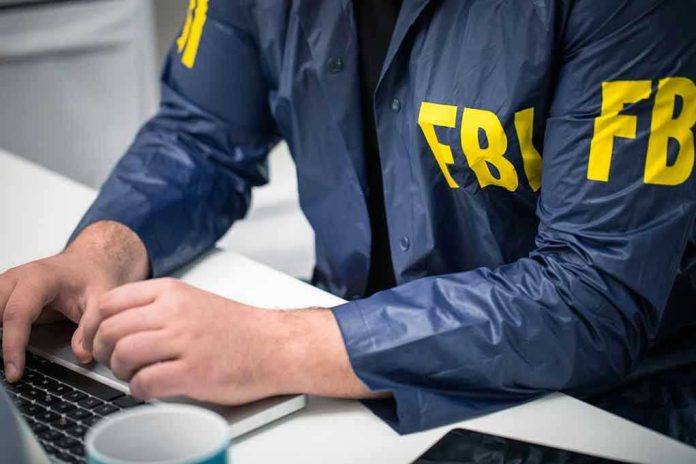
A California man’s arrest for sending money to ISIS has reignited serious concerns about domestic terrorism and exposed glaring weaknesses in America’s ability to prevent foreign radicalization within its borders.
Story Snapshot
- FBI arrest in Long Beach uncovers suspected ISIS supporter and an apparent bomb in a U.S. home
- Suspect, a lawful permanent resident from the Philippines, sent a dozen payments to intermediaries for ISIS
- Authorities allege small but repeated transfers and social media radicalization fueled the case
- Case raises alarm about security, immigration, and government vigilance after years of leftist policies
FBI Arrest in Long Beach Exposes Suspected Domestic ISIS Support
Federal authorities arrested Mark Lorenzo Villanueva, a 28-year-old lawful permanent resident from the Philippines, on August 1, 2025, charging him with attempting to provide material support to ISIS. FBI agents allege he made a dozen payments through Western Union, totaling $1,615, over a five-month period. These funds, according to prosecutors, were destined for ISIS fighters via overseas intermediaries. The investigation began after Villanueva expressed a desire on social media to join ISIS, directly referencing buying equipment and weapons. During the arrest, agents discovered what appeared to be an explosive device in his Long Beach residence, a chilling reminder that radical threats can emerge from within U.S. communities, not just abroad.
California Man Arrested for Sending Payments to ISIS, Authorities Shocked by What They Find During Arresthttps://t.co/kNRbYk7jB9
— RedState (@RedState) August 2, 2025
The suspect’s status as a lawful permanent resident—rather than a citizen—adds another layer to a story that underscores the ongoing risks associated with immigration policies that lack robust vetting and follow-up. Prosecutors allege that Villanueva not only sent money overseas but also made statements about fighting and dying for his faith, suggesting a deep ideological commitment to ISIS’s cause. The FBI, which leads the investigation, has not publicly detailed the full capability of the recovered device, but the agency’s swift action likely prevented a tragedy. The case highlights persistent vulnerabilities in detecting small-scale financial support for terrorism and the role of online radicalization—a trend law enforcement has struggled to contain for years under prior administrations.
Domestic Terrorism: The Role of Social Media and Financial Networks
The Villanueva case is a stark reminder that social media platforms remain fertile ground for radicalization and recruitment, allowing terrorist networks to reach sympathizers on U.S. soil. From February to July 2025, Villanueva used these platforms to connect with intermediaries and arrange his payments. While the amounts sent were not large, the frequency and intent are what drew the attention of federal authorities. Legal experts point out that U.S. law, specifically 18 U.S.C. § 2339B, makes it a federal crime to provide material support to designated terrorist organizations, regardless of the scale or success of the transfer. Prosecutors from the U.S. Attorney’s Office for the Central District of California swiftly charged Villanueva, who now faces up to 20 years in federal prison if convicted.
Law enforcement officials are using this incident to call for renewed vigilance on financial transactions and social media activity linked to extremism. U.S. Attorney Bill Essayli stated, “Supporting a terrorist group, whether at home or abroad, is a serious risk to our national security. We will aggressively hunt down and prosecute anyone who provides support or comfort to our enemies.” This message aligns with conservative principles of prioritizing national security, enforcing the law without exception, and demanding accountability from both individuals and the government entities responsible for protecting the homeland.
Broader Implications: Immigration, Security, and Policy Response
The arrest has immediate and far-reaching implications for communities across America, especially in urban areas with diverse immigrant populations. In Long Beach, residents now face increased law enforcement presence and heightened scrutiny—an unfortunate but necessary reaction when domestic terrorism becomes a reality. The Filipino-American community, in particular, may experience a period of unwanted attention and concern over broader stigmatization. The case also raises questions about the effectiveness of previous government policies regarding both border security and the monitoring of noncitizen residents.
Long-term, the Villanueva case could drive calls for stricter monitoring of financial remittances and more aggressive counter-radicalization strategies within immigrant communities. Financial services companies may face pressure to enhance their ability to flag suspicious transactions, while social media companies will again be asked to balance privacy concerns with their responsibility to detect and report extremist activity. From a conservative perspective, this incident is a stark indictment of years of lax oversight and misguided priorities that allowed radicalized individuals to operate undetected. The fact that a suspected bomb was recovered only after multiple transfers had been made raises legitimate questions about government vigilance and the need for policies that put American safety first.
Expert Perspectives and Conservative Analysis
Counterterrorism experts agree that small-scale financial support for terrorist groups is both persistent and difficult to detect, especially when using mainstream payment systems and encrypted communications. Legal analysts stress the importance of prosecuting such cases to deter others, while community leaders encourage preventive measures without stigmatizing entire populations. Academic voices remind policymakers that online radicalization remains a top challenge, requiring both government and private sector cooperation. Civil liberties advocates, meanwhile, urge caution about expanding surveillance powers, but even they acknowledge the danger posed by material support to terrorist organizations.
For readers who value American freedom, family, and constitutional rights, this case is a sobering reminder of the threats that remain and the necessity of strong, clear-headed leadership. The Biden administration’s approach to border security and counterterrorism has faced criticism for its perceived weaknesses, and incidents like this underscore why many Americans demanded change. Defending the Constitution and protecting American lives must remain the top priority; anything less is a failure of government’s most basic duty.







